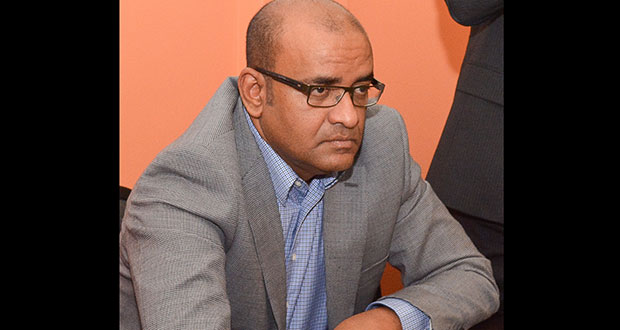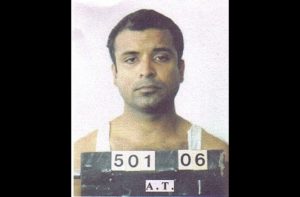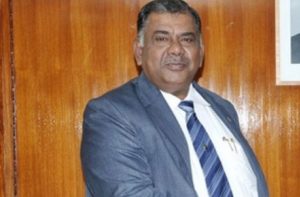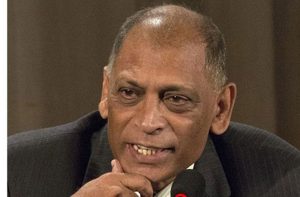October 14,2016 Source

REFERRING to this period as the “Troubles”, President David Granger on Thursday told the National Assembly of what he called the descent of this country during the Bharrat Jagdeo administration, describing it as the “darkest hour” that was characterised by drug-driven chaos and bloodshed. Jagdeo was President of Guyana from August 11, 1999 to December 3, 2011 during which there were three massacres: Lusignan where 11 people were killed- Bartica where another 12 were killed and Lindo Creek where seven miners were slaughtered. Besides, there were countless extra-judicial killings- with some activists estimating that around 400 Afro Guyanese males were gunned down.

President Granger’s remarks were made during an address at the opening of the sitting of Parliament, following a nine-week period of recess. In August 2015, Granger had said that the extra-judicial killings that beleaguered the nation during the 2002-2008 period must be investigated thoroughly. The President had said then that his government was in the process of ensuring that there is an efficient and effective Coroner’s Department in place to investigate the crimes of that period. He stressed that all cases must be investigated, as every loss of life is worrisome.
Back in 2003-2006, convicted drug-trafficker, Shaheed Roger Khan, had set up a criminal network here including active policemen and a number of former ranks, ostensibly to go after criminals, but at the same time protecting his narco-trafficking interests. He was nabbed in neighbouring Suriname in 2006 while fleeing local police, and was later handed over to U.S. authorities.
Although the PPP Government had sought to distance itself from Khan, the drug-trafficker had stated publicly in an advertisement in local newspapers that he had been fighting crime on behalf of the Bharrat Jagdeo-led government. Khan had also implicated former Health Minister Dr Leslie Ramsammy in his escapades, and documents bearing the then minister’s signature authorising the purchase of a sophisticated wire-tapping device were produced in U.S. courts during Khan’s trial.
The quality of life
Titling his address “The quality of life,” President Granger said ‘quality of life’ is a measure of citizens’ satisfaction with their lives. He said people’s personal values and life experiences determine their level of satisfaction, which includes health, independence, participation in community and civic activities, personal development, physical and material well-being, recreation, relationships with other people and social support.

“Citizens, usually, are uncomfortable with high levels of crime; insanitary conditions in the countryside and city and incivility by officials, all of which contribute to lowering the ‘quality of life.’” President Granger said these conditions should not be regarded as a permanent state, but as temporary problems to be solved.
He said the State, regional administrations, the media, municipalities, trade unions and civil society can do much to enhance the quality of life, to give citizens the feeling of satisfaction and to solve the problems that affect them.
“Public services are essential to citizens’ ‘quality of life.’ Public services involve public trust. Citizens expect public servants to serve the public interest with integrity and reliability in order to manage public resources efficiently.”
Mr Granger said public trust encourages active citizen participation in society and the economy, noting that it makes public agencies more accessible and more accountable.
“Reliable public services inspire public trust and create a favourable environment for human safety and for the functioning of businesses, thereby contributing to well-functioning markets, economic growth and, consequently, a high ‘quality of life.’”
Horrible nightmare
However, President Granger said the dreams of a ‘good life’ had turned into a horrible nightmare at the dawn of the new millennium.
“The most unforgettable experiences and most frightening evidence of our descent into chaos were the bloody, drug-driven, decade-long ‘Troubles.’ The ‘Troubles’ will be remembered as the darkest hour in our history. It was a time of the un-investigated assassination of a minister (Satyadeow Sawh); of the uninvestigation into the alleged implication of another minister (Ronald Gajraj) in the direction of a ‘death squad’; of the alleged implication of yet another minister (Dr Leslie Ramsammy) in the acquisition of a computer to track the telephone communication and location of adversaries targeted for assassination.”
President Granger said it was a time of arbitrary arrests; of disappearances and of torture of young men; of the surge in armed robberies, narco-trafficking and gun-running. He said during that first, deadly decade, there were 1,317 murders and 7, 865 armed robberies.
“It was a time of deception and the cynical rejection of £4.9 million UK Security Sector Reform Action Plan for which a Memorandum of Understanding was signed in August 2007; of the rejection of recommendations of numerous security reform reports and total disregard for the implementation of the National Drug Strategy Master Plan,” Granger a retired army brigadier said. He told the House that evidence of the impact of the man-made criminal crisis is still visible. “The damage is most manifest in the demoralisation of the public and security services, the erosion of public trust and the lowering of the ‘quality of life.’”
Parlous economic state
Turning his attention to the economic situation, President Granger told the House that the grisly security situation was accompanied by a parlous economic situation, noting that the undermining of public infrastructure by the encouragement of cronyism led to serious, costly, serial scandals as seen in the construction the Kato Secondary School; the Hope Canal bridge; the river-front revetment at Kumaka, Barabina road and Moruca bridge; Supenaam stelling and the still unusable Ministry of Social Protection building in Georgetown.
“The paralysis of public telecommunications became evident in the incompetent or corrupt implementation of the US$ 70 million Fibre Optic Cable Project and the misapplication of computers under the ‘One Laptop per Family’ Project.”

President Granger said the environmental policy will be remembered, forever, but not fondly, by the administration’s responsibility for the most destructive environmental disaster in Guyana’s history — the catastrophic 2005 flood.
This, he said, was an event of incalculable damage, disease, discomfort and, in some cases, death.
“The exaggerated emphasis on narrow elements of the Low Carbon Development Strategy obscured the absence of strategic thought and action. Guyana’s rich biodiversity, wildlife, wetlands, coastal zone, rivers were not adequately protected against the ravages of lawless logging, mining and solid waste mismanagement,” President Granger said.
Economic policy
He told the Parliament that his Government entered a depressing financial landscape in May 2015.
“The economic legacy that this nation inherited was characterised by a lack of strategic planning and whimsical decision-making. The absence of a policy to provide employment opportunities for youth and to reduce extreme poverty and the failure to energise the manufacturing sector weakened the economy,” President Granger said.
He noted that economic mismanagement was accompanied by huge debts for unpaid international obligations and court judgements. He said the gravest financial problem was the bankruptcy of the Guyana Sugar Corporation (GUYSUCO) which owed $89 billion in debts.
“Your Government was forced to divert money from economic development and social projects to rescue the ailing corporation with an immediate injection of $12 billion. An additional $11 billion had to be provided the next year, 2016, making a total of $23 billion bailout in 18 months.”
The President said these transfers exclude the servicing of GUYSUCO’s debts in respect of the Skeldon Estate Modernisation Project – a monstrous and monumental US$ 200 million mistake and, probably, Guyana’s single most costly industrial catastrophe of all time.
“Paddy farmers in the rice industry were not spared the previous administration’s reckless mismanagement. The PetroCaribe Fund,used to meet payments to farmers for rice and paddy shipped to Venezuela, contained less than US$1 million in May 2015. Your Government was forced to make available nearly $4 billion immediately so that poor paddy farmers could be paid.”
The President added, that his administration inherited a large number of liabilities, including judgements in excess of US$34 million (or G$7 billion) in favour of NH Elias, in respect of the East Bank Demerara Road; judgement for $1.3 billion in favour of Rudisa Beverages; judgement in favour of Trinidad Cement Limited; settlement for$1.4 billion with B.K. Tiwari on the Haags Bosch Project and several other judgements that will cost the State over $1 billion.
“Your Government, also, was obliged to provide another $5.4 billion bailout [for]the National Insurance Scheme as a consequence of the previous administration’s irresponsible CLICO investment. Your Government, despite encountering this immense mountain of debt, was able to meet commitments to the nation’s hard-working public servants. The minimum wage grew from $39,520 in May 2015, to $55,000 in January 2016, an increase of 39.2 per cent in seven months.”
Public servants
The Guyanese leader said despite these troubles, public servants benefited, in addition, from the raising of the tax threshold, from $600,000 in May 2015 to 660,000 in January 2016; the removal of income tax from workers’ contributions to the National Insurance Scheme and a tax-free payment of $50,000 to all workers earning less than $500,000, in December 2015. “These benefits, taken together, augmented workers’ disposable incomes significantly. Collective bargaining with public servants’ unions could result in additional benefits in the form of increased increments, allowances and adjustments made for ‘de-bunching’. Old-age-pensions have been increased from $13,120 to $18,200 or by 38.7 per cent, and Public Assistance increased by 24 per cent during the same period, May 2015 to April 2016,” President Granger said.
